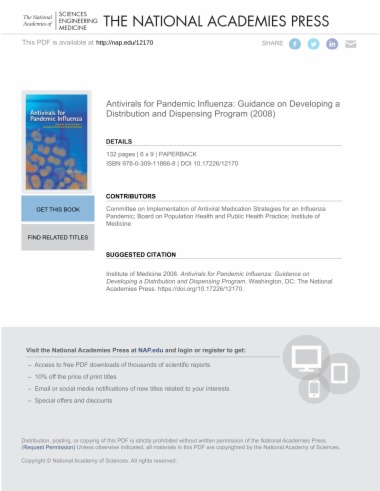Planning for an influenza pandemic, whether it occurs in the near or distant future, will need to take into account many constantly evolving factors. The Institute of Medicine (IOM) Committee on Implementation of Antiviral Medication Strategies for an Influenza Pandemic was asked by the Department of Health and Human Services, (DHHS) to consider best practices and policies for providing antiviral treatment and prophylaxis during a pandemic event.
The committee's report, entitled Antivirals for Pandemic Influenza: Guidance on Developing a Distribution and Dispensing Program, calls for a national and public process of creating an ethical framework for antiviral use within the context of uncertainty and scarcity. It is unclear whether antivirals will work against a pandemic strain as well as they work against seasonal influenza. Also, government stockpiles may not be sufficient for all possible uses in part because antivirals are costly and public health agencies must invest in other important activities, including other medical resources for pandemic influenza. Furthermore, the report identifies the lack of a science-based advisory body to guide decision making during the pandemic, including guidance on all dimensions of antiviral dispensing (for example, prioritization, drug safety, and antiviral resistance). The report also acknowledges the need for diverse methods and sites of dispensing, and discusses their advantages and disadvantages.
- Cover
- Front Matter
- Summary
- 1 Introduction
- 2 Antiviral Effectiveness, Safety, and Supply
- 3 Ethics, Decision Making, and Communication
- 4 Who Should Get Antivirals and Where?
- References
- Appendix A: Summary of Lessons Learned from Other Mass Distribution Events
- Appendix B: State Plans
- Appendix C: Meeting One Agenda
- Appendix D: Meeting Two Agenda
- Appendix E: Committee Member Biographies

